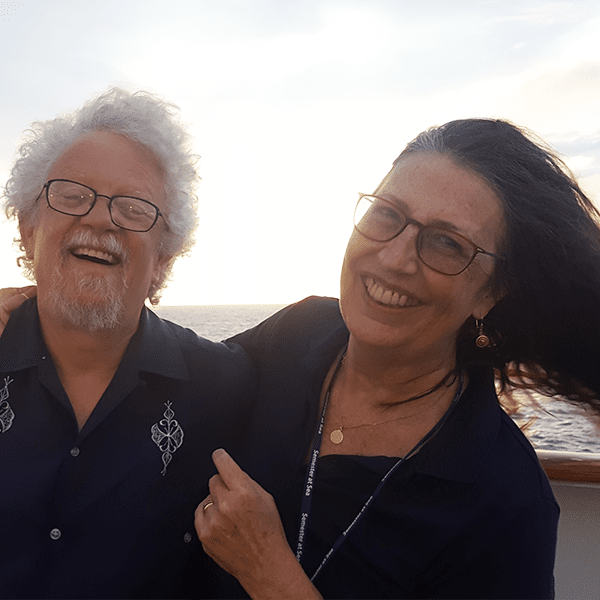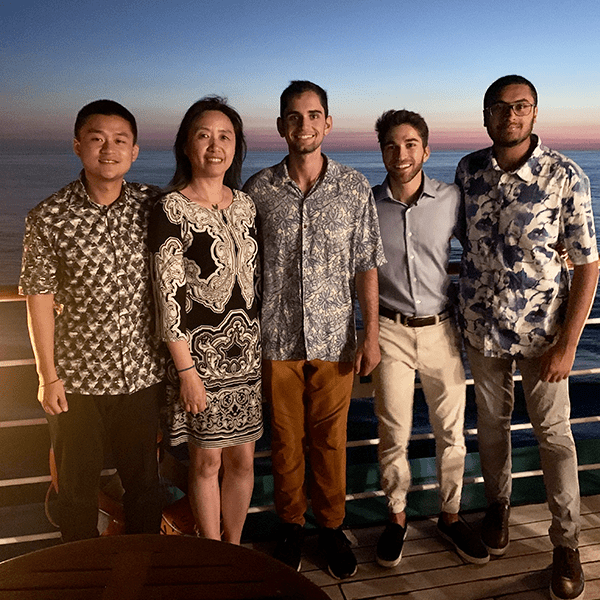Our journey with the wonderful people of SAS on the fateful Spring 2020 Voyage – even with all the pandemic concerns, and the itinerary and port changes – was still enormously stimulating, enjoyable, and eye-opening! We made lifelong friends, lifelong memories, and gained all sorts of insights and knowledge from the people and places we visited, and from the world-class faculty, staff, students, and our fellow Lifelong Learners!
Voyages
Spring 2025:
Asia, Africa, and Europe Exploration
Exploring countries in Asia, Africa, and Europe, this voyage gives participants a truly global study abroad experience on our floating campus!
Explore, Learn, and Grow
Join Semester at Sea as we sail to countries in Asia, Africa, and Europe. You’ll experience a wide range of cultures and histories — including the urban center of Ho Chi Minh City, Vietnam; a rural Indian village; the savory cuisines of Ghana; Spain; and a whole lot more — all while living and learning aboard a ship you’ll call home with a community that’s designed to build friendships for life.
Make the Voyage Your Own
With guided Field Programs and plenty of opportunities for in-country travel on your own or with fellow SAS voyagers, you’ll explore your interests and deepen your understanding of the world. Bring a sense of adventure and a willingness to discover the unknown.
Voyage Map
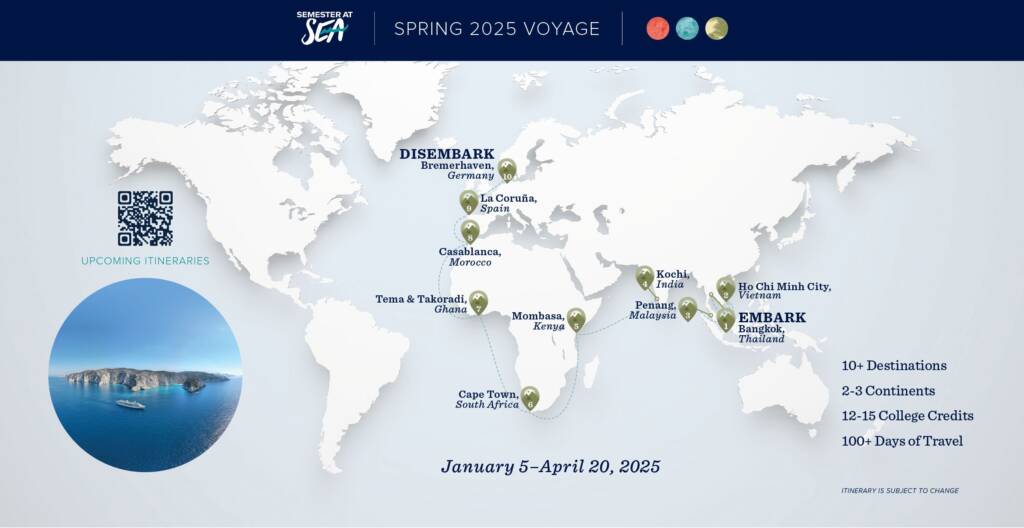
- Bangkok, Thailand
- Ho Chi Minh City, Vietnam
- Penang, Malaysia
- Kochi, India
- Mombasa, Kenya
- Cape Town, South Africa
- Tema & Takoradi, Ghana
- Casablanca, Morocco
- La Coruna, Spain
- Bremerhaven, Germany
-
1
Bangkok, Thailand
Jan 05Thailand has emerged as one of the most visited travel destinations in the world. Travelers flock to this warm destination for the tranquil beaches, delicious cuisine, magnificent temples and scenery, colorful history, and archaeological sites. Affectionately nicknamed as “a land of smiles”, Thai locals are known for being warm and welcoming, and their hospitality is considered to be world class.
- capitol Bangkok
- language Thai
- religions Theravada Buddhist
- government Constitutional Monarchy
- currency Thai baht
- population 71.6 million (2021)
-
2
Ho Chi Minh City, Vietnam
Jan 12 – Jan 17Vietnam is known for its lush, emerald green mountains, outstanding cuisine, and welcoming citizens. Here you can explore the Cu Chi Tunnels where Viet Cong soldiers lived and fought, travel by boat through the Mekong Delta, sample world-class pho, or bike through small villages. Students often enjoy a three-day trip to Cambodia from Vietnam to interact with an NGO that educates and trains disadvantaged locals in rural areas for employment in the hospitality industry. Semester at Sea ports of call in Vietnam include Ho Chi Minh City. Field Program options include cruising down the Mekong Delta or having a homestay with a local family. Highlights include a multi-day trip to Ha Noi and Ha Long Bay.
- capitol Hanoi
- language Vietnamese
- religions Atheism, Daoism, Buddhism, Confucianism
- government Unitary state, communist state, socialist state
- currency Vietnamese đồng
- population 97.34 million (2020)
-
3
Penang, Malaysia
Jan 23 – Jan 28What makes Malaysia worth visiting is the country’s diversity. Within this one country, you get to explore thriving, modern cities while exploring colonial architecture. At the same time, you have the option to relax on some of the world’s most beautiful beaches and trek in lush green jungles home to orangutans, leopards, tigers, elephants, and more. Semester at Sea ports of call in Malaysia include Penang. Field Program options include visiting Kuala Lumpur and taking Malaysian cooking classes. Highlights include a multi-night trip to Malaysia’s Peninsula, exploring rainforests and cities, and staying with a local family.
- capitol Kuala Lumpur
- language Malay
- religions Islam, Buddhism, Christianity, Hinduism
- government Democracy, parliamentary system, constitutional monarchy, elective monarchy
- currency Malaysian ringgit
- population 32.37 million (2020)
-
4
Kochi, India
Feb 04 – Feb 09As one of the most populous nations in the world, India is bustling with a vibrant culture influenced by a variety of religions, including Hinduism, Jainism, Buddhism, and Sikhism. Semester at Sea ports of call in India include Cochin and Mumbai. Field Program options include multi-day trips to Mumbai, the Taj Mahal, New Delhi, and more. Highlights include exploring the Taj Mahal, one of the world’s seven wonders, or traveling to the holy city of Varanasi on the Ganges River. Get a taste of how 70% of Indians live by visiting the rural, traditional Chendamangalam village.
- capitol New Delhi
- language Hindi, English
- religions Hinduism, Buddhism, Jainism, and Sikhism
- government Parliamentary system, federal republic, parliamentary republic, constitutional republic
- currency Indian rupee
- population 1.38 billion (2020)
-
5
Mombasa, Kenya
Feb 17 – Feb 22When it comes to wildlife destinations, Kenya is hard to beat. Between parks, reserves, and private conservations, Kenya is home to some of the most diverse wildlife populations on the planet. Semester at Sea ports of call in Kenya include Mombasa. Highlights include visiting the grassy plains of Amboseli National Park where elephants are silhouetted against Mount Kilimanjaro, among other animals such as giraffes, zebras, hippos, lions, cheetahs, and more. Students also have the chance to see Lake Turkana, a UNESCO world heritage site recognized for holding ancient artifacts from the oldest humans found to date.
- capitol Nairobi
- language Swahili
- religions Protestant Christianity, Catholicism, indigenous religions
- government Republic, unitary state, representative democracy, presidential system
- currency Kenyan shilling
- population 53.77 million (2020)
-
6
Cape Town, South Africa
Mar 03 – Mar 08Whether hiking Table Mountain for one of the world’s best views, riding horseback on safari, or engaging with local entrepreneurs in Cape Town, students always fall in love with South Africa. Full of adventure and captivating sights, Cape Town offers countless opportunities for cultural and natural exploration. Semester at Sea ports of call in South Africa include Cape Town. Field Program options include overnight trips to a safari park, seeing lions, giraffes, hippos, zebras, and more. Highlights include taking an aerial cableway up Table Mountain and visiting the Apartheid Museum.
- capitol Cape Town (legislative), Pretoria (administrative), and Bloemfontein (judicial)
- language Ndebele, Pedi, Sotho, Swati, Tsonga, Tswana, Venḓa, Xhosa, Zulu, Afrikaans, English
- religions Christianity, Islam, Hinduism, traditional African religions, and Judaism
- government Parliamentary republic, constitutional republic
- currency South African rand
- population 59.31 million (2020)
-
7
Tema & Takoradi, Ghana
Mar 17 – Mar 22Ghana is a sub-Saharan beauty bursting with a unique and thriving culture. Outdoor enthusiasts will enjoy treks through the Accra plains and neighboring reserves. Semester at Sea ports of call in Ghana include Tema and Takoradi. Common Field Programs include visiting the Cape Coast Slave Dungeons for a historical Ghanaian perspective on the 17th-century slave trade, easily accessible from Takoradi. Additional highlights include an authentic village immersion experience or an adventurous canopy walk.
- capitol Accra
- language English
- religions Christianity, Islam, Indigenous religious beliefs
- government Unitary state, presidential system, constitutional republic
- currency Ghanaian cedi
- population 31.07 million (2020)
-
8
Casablanca, Morocco
Apr 01 – Apr 06The Kingdom of Morocco is an immensely rich cultural center point of north-western Africa. The port of Casablanca, established in the 20th century, is a busy metropolis and home to the Hassan II Mosque, the second largest in the world after Mecca. This enormous structure, resting at the edge of the Atlantic Ocean, was built by 30,000 workers over a period of five years, officially opening in 1993. Semester at Sea ports of call in Morocco include Casablanca and Tangier. Field Program options include multi-day trips to the Sahara Desert, where students can ride camels to their campsite and sleep under the stars. Highlights include visiting Chefchaouen, otherwise known as the blue city, eating popular Moroccan dishes such as couscous and tagine, and drinking mint tea.
- capitol Rabat
- language Arabic, Tamazight, Tachelhit, Tarifit, French
- religions Islam
- government Monarchy, unitary state, parliamentary system, constitutional monarchy
- currency Moroccan dirham
- population 36.91 million (2020)
-
9
La Coruna, Spain
Apr 09 – Apr 13Spain’s diverse landscape, architecture, art, and cuisine make the country rich in culture and charm. Semester at Sea ports of call in Spain include Barcelona, Valencia, and La Coruna. Field Program options include explorations of the art, culture, and architecture of the two diverse regions. Highlights include overnight trips to Sevilla, Granada, and Madrid, with opportunities to explore the cathedrals, gardens, palaces, and other cultural sites that reflect Spain’s Moorish and Islamic heritage.
- capitol Madrid
- language Castillian Spanish, Catalan, Galician, Basque, Aranese
- religions Catholicism
- government Monarchy, unitary state, parliamentary system, constitutional monarchy
- currency Euro
- population 47.35 million (2020)
-
10
Bremerhaven, Germany
Apr 20Germany is a must-see destination for its combination of old-world charm and modern urban cities. From beautiful scenery and great architecture to lively festivals, exciting nightlife, and delicious cuisine, Germany offers it all. Semester at Sea ports of call in Germany include Bremerhaven. Highlights include overnight trips to Berlin, an ideal place to experience a buzzing European metropolis with a rich history.
- capitol Berlin
- language German
- religions Roman Catholic, Protestant
- government Federal republic, representative democracy, Parliamentary republic, constitutional republic
- currency Euro
- population 83.24 million (2020)
Diversion Ports
As we have been operating shipboard voyages since 1963, we’ve learned that itineraries are subject to adjustment. More than half of our voyages have required some deviation from the planned itinerary. The need to change an itinerary prior to and/or during a voyage can arise due to a number of factors: weather, political unrest, and other health and safety considerations. Should there be a need to adjust our published plans, we have identified potential diversion ports in each region of our expected travel. These ports are selected based on a number of factors including safety, educational value, and accessibility. These diversion ports simply serve as a backup should anything prevent us from traveling to our planned itinerary.
Other ports may be added as required. Just as our world is dynamic, this list of potential ports is also subject to change. Every destination must pass a comprehensive health and safety assessment, regardless of being a planned or diversion port.
Spring 2025 Diversion Ports
- Singapore
- Male, Maldives
- Victoria, Seychelles
- Port Louis, Mauritius
- Durban, South Africa
- Walvis Bay, Namibia
- Las Palmas, Canary islands, Spain
- Cadiz, Spain
- Lisbon, Portugal
- Brest, France
Voyage Curriculum
The Perfect Mix of Classroom and Field Education
Semester at Sea’s global comparative study abroad program is enhanced by a robust academic program led by a team of academic experts from renowned institutions around the world. During the 100+ day voyage, students can earn 12-15 credits from Colorado State University, while taking major or elective courses, drawn for 20-25 fields of study. Each class also includes academically required Field Work courses, which are developed by faculty and allow for experiential in-country learning throughout the voyage.
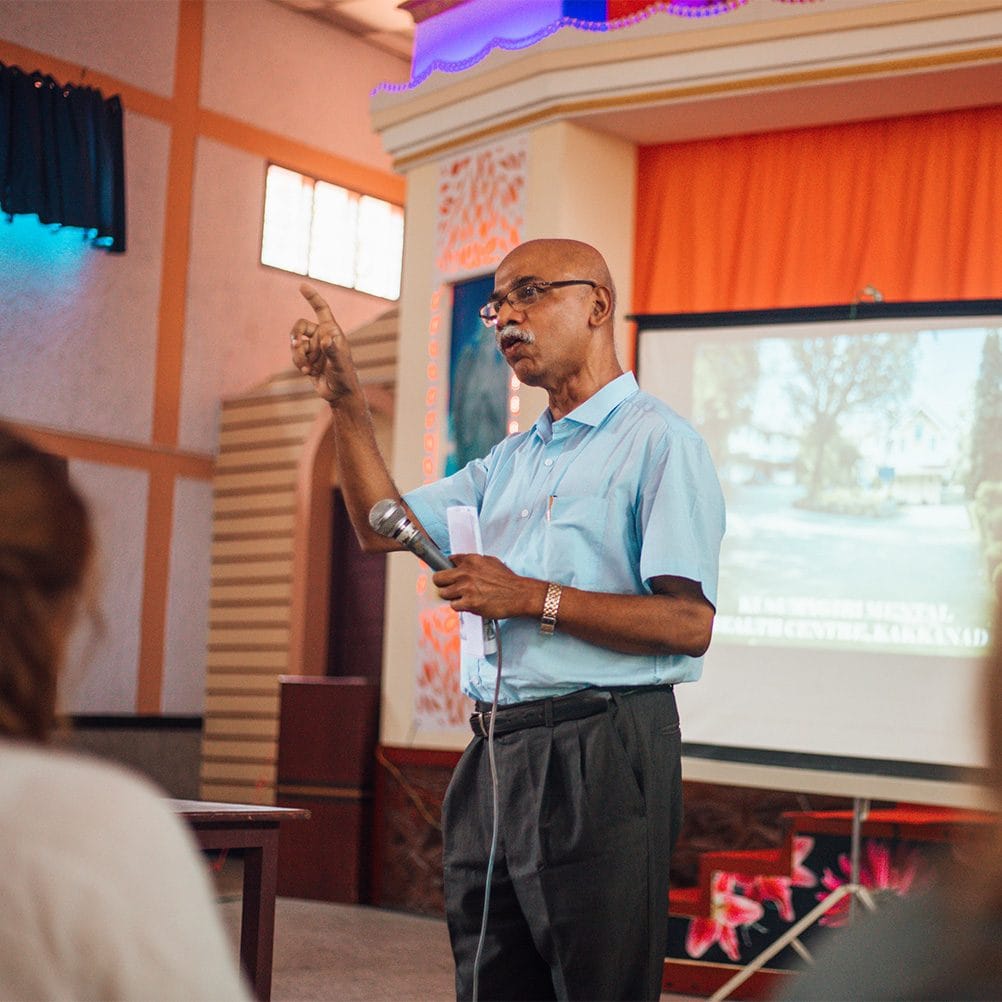
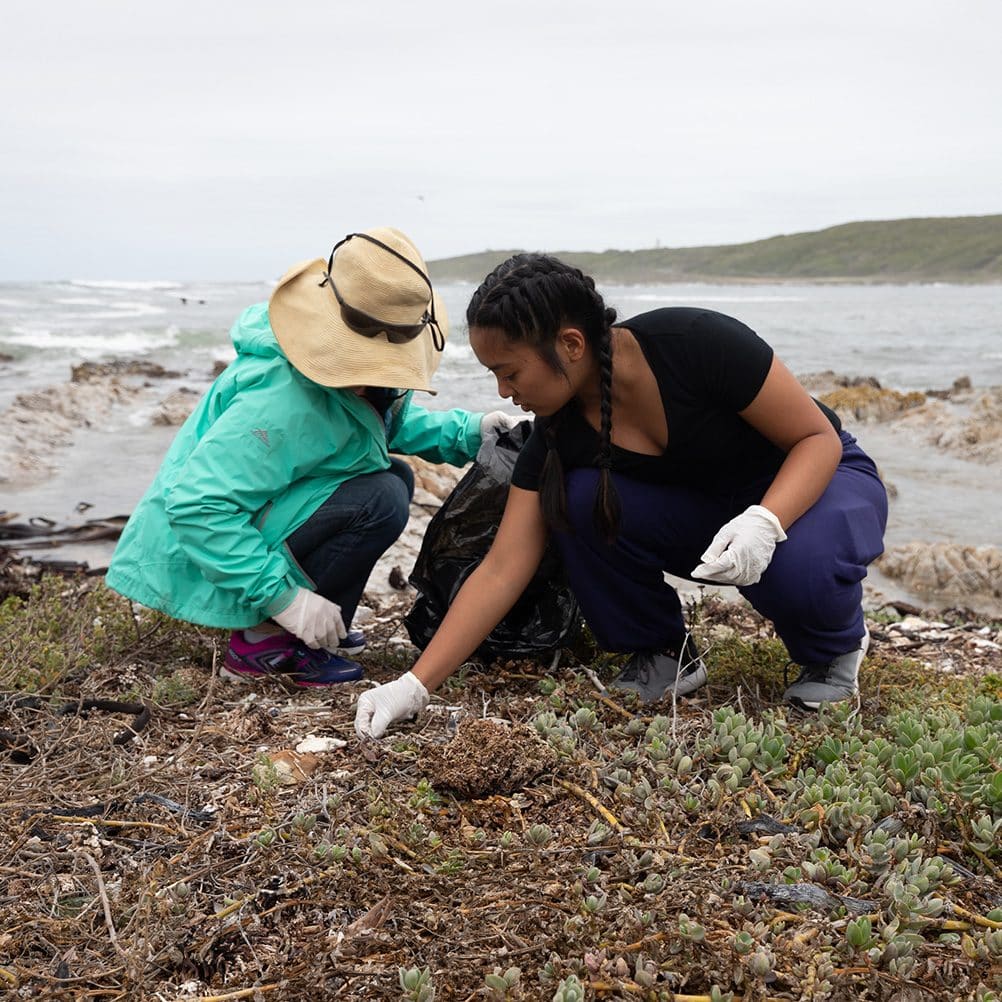
Field Programs
Semester at Sea Field Programs
When Semester at Sea arrives in each country, voyagers will either explore via required Field Work for their classes (for voyagers enrolled in academic courses), participate in optional Semester at Sea-designed Field Programs, or they can plan their own travel experiences.

Looking to Sail as a Lifelong Learner?
Semester at Sea’s Lifelong Learning program provides adult educational travel to people at least 30 years of age who are seeking an opportunity to travel and learn as part of the Semester at Sea community. There are opportunities to sail on a full or partial (Spotlight) voyage.
Program Fees Overview
A Study Abroad Experience Is a Significant Investment — and Also One of the Best Investments for a Student’s Future.
In addition to earning 12-15 transferable college credits from Colorado State University, student program fees include many amenities and benefits to support students before and during their study abroad experience.
A look into what’s included:
- Semester’s tuition and travel
- Housing, meals, and amenities
- Academic Field Classes
- Email account
- Starter Internet package
- Comprehensive travel health insurance
- Pre-voyage advisement and on-site residential student services staff
- Fuel fee — subject to change depending on global cost fluctuations
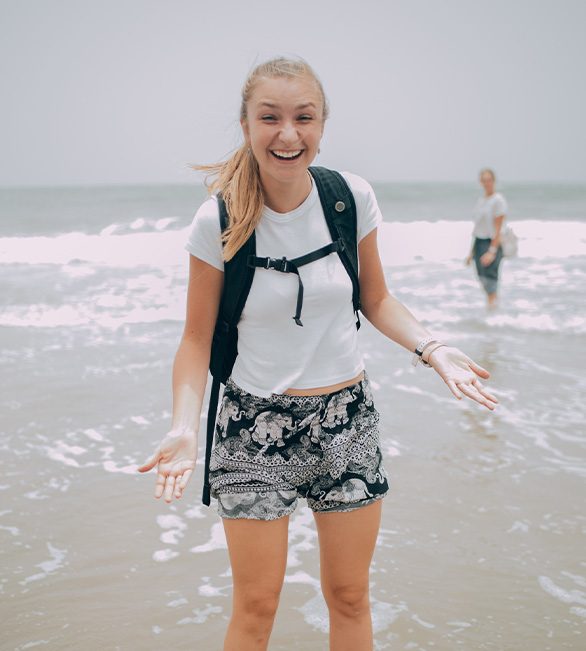
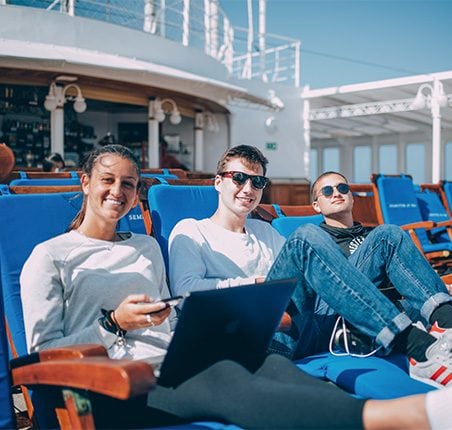

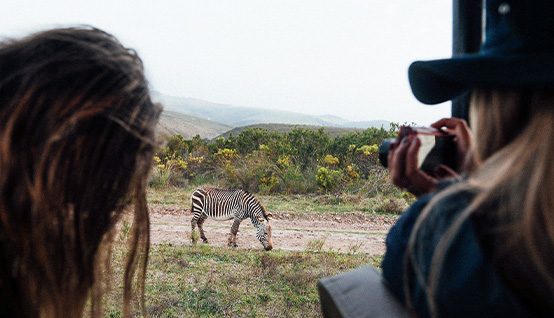
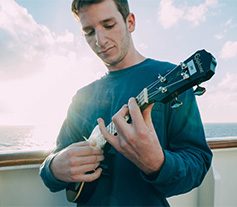
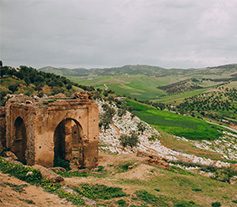
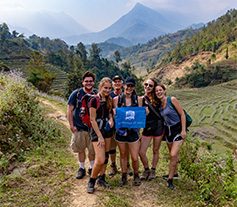
Hear From Past Voyagers
Admissions
Semester at Sea welcomes curious, engaged students of any sex, gender identity, race, disability status, veteran status, nationality, or ethnicity to apply to travel the world as part of our living and learning community.
Frequently Asked Questions
Everything you need to know about joining a Semester at Sea voyage.
Once the Office of Admission has received your completed application, you will receive a reply in about 7-10 business days. It is advisable to follow up and verify that all components of your application have been received.
Yes, students from all majors regularly enroll in Semester at Sea. More than 40 majors are typically represented on any given voyage.
It varies. Voyages typically fill one to four months prior to sailing. We encourage you to submit your application early but please contact our office if you have a last-minute opportunity to join our program for the semester.
Semester at Sea operates on a rolling admissions basis, meaning there are no application deadlines for specific semesters. However, it is recommended that you begin the application process 12 months before the semester in which you would like to participate. Applications will continue to be accepted until approximately one month before the start of the voyage.
Semester at Sea, like any company, sets up a yearly budget based largely on estimates of fixed and variable costs with some room for variation. We are directly impacted from time to time just as everyone is in the travel industry and the maritime industry in particular, with periodic and significant overall increases in our fuel prices. Depending on each port’s regulatory and environmental requirements, we have to consider at least two different types and grades of fuel, each with significantly different price points. Political unrest in certain parts of the world, as well as periodic natural disasters, also can contribute to increasing and unpredictable volatility as well, which in turn lends to overall instability and unpredictability in fuel prices. Fuel charges remain a material component of our overall cost structure. We make every effort to contain fuel costs through enhanced itinerary planning (which we conduct one to two years in advance), and through the use of standard advance fuel purchase commitment arrangements when appropriate. However, it is impossible for us to accurately predict what we might pay for fuel per voyage, port-to-port. Like airlines and major shipping companies, we regrettably must offset these higher costs from time to time with additional fuel surcharges.
In order to facilitate your financial planning, we may invoice you with a “fuel fee,” which at the time is our best indication of what our final “fuel surcharge” is expected to be. In advance of sailing, Semester at Sea may enact a fuel supplement surcharge for all participants, in the event that the average price for the blended types of fuel and related costs during the voyage is expected to exceed a certain budgetary threshold in pricing per metric ton, the amount of which will be offset by advance fuel fee billings/payments. These incurred costs include not only what is expected to be paid in various ports, but also include additional costs for fuel contracts entered into. These fuel contracts are intended to cushion the financial impact if future fuel prices became volatile. Such surcharges when enacted are necessary to offset the total excess fuel costs that exceed this budget threshold. For more information please review our fuel surcharge policy.
